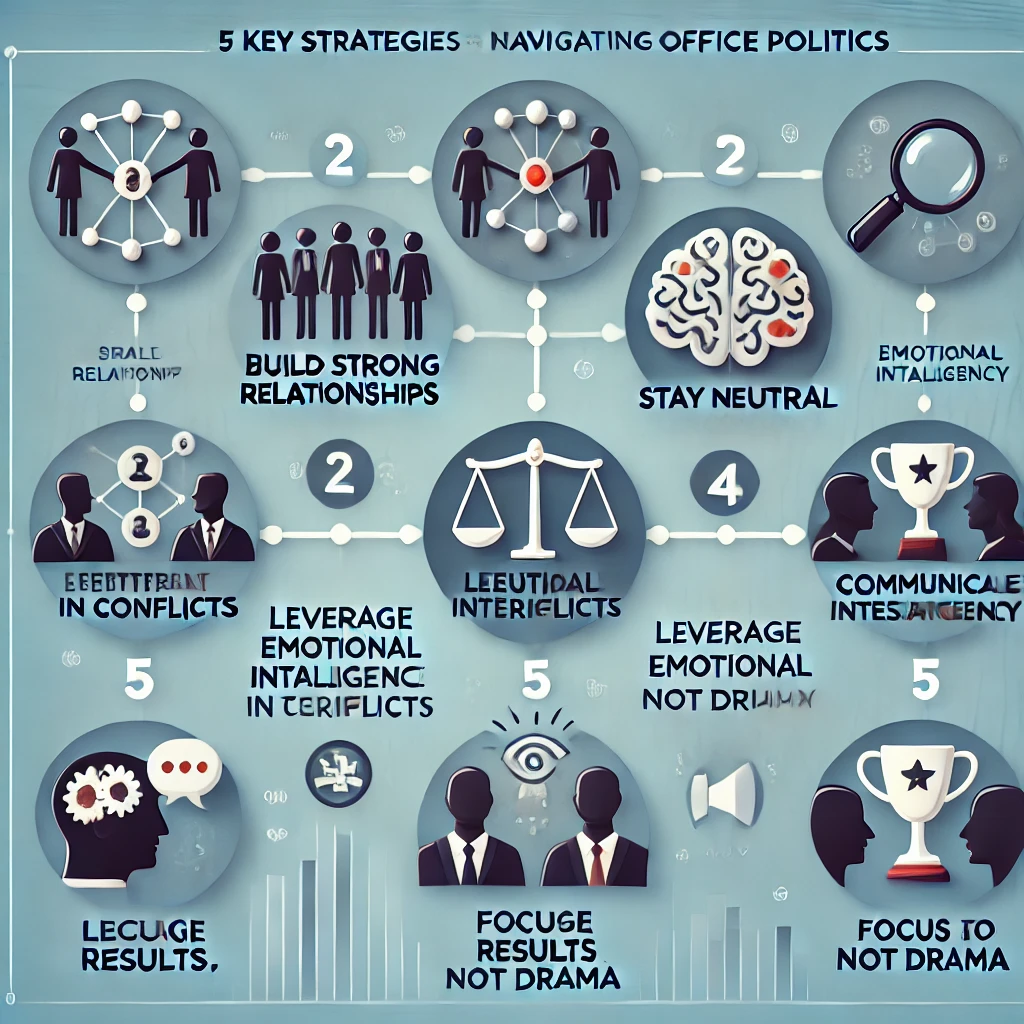Becoming a manager is a significant career milestone, but it’s not without its challenges—especially when it comes to office politics. In the USA, where workplace dynamics can be intricate and competitive, mastering the art of navigating office politics is essential for new managers. Whether you’re leading a small team or an entire department, understanding how to handle these dynamics can determine your success. In this guide, we’ll dive into practical strategies, real-life examples, and expert advice to help you thrive as a new manager in the American workplace.
Why Office Politics Matter for New Managers
Office politics is an unavoidable aspect of any workplace. It’s the informal network of power, alliances, and relationships that influence decisions and interactions. As a new manager, you’re not just responsible for your own career growth but also for the success of your team. Ignoring office politics can lead to misunderstandings, strained relationships, and even career setbacks. On the flip side, mastering it can help you build influence, foster collaboration, and create a positive work environment.
5 Strategies to Navigate Office Politics as a New Manager
1. Build Strong Relationships Across the Organization
One of the most effective ways to navigate office politics is to cultivate genuine relationships with colleagues at all levels. As a new manager, take the time to understand the dynamics within your team and the broader organization. Schedule one-on-one meetings with team members, peers, and senior leaders to learn about their goals, challenges, and expectations.
Real-Life Example: Sarah, a new manager at a tech company in Silicon Valley, noticed tension between her team and the marketing department. Instead of taking sides, she organized cross-departmental brainstorming sessions to align goals. By fostering collaboration, she not only resolved the conflict but also earned respect from both teams.
Tip: Avoid forming cliques or showing favoritism. Strive to be approachable and fair in all your interactions.

2. Stay Neutral in Conflicts
As a manager, you’ll often find yourself in the middle of disagreements or power struggles. It’s crucial to remain neutral and avoid taking sides. Instead, focus on facilitating open communication and finding solutions that benefit everyone.
Example: Imagine two team members are competing for a promotion and start undermining each other. Instead of favoring one over the other, address the behavior privately and encourage healthy competition. Reinforce the importance of teamwork and shared goals.
Tip: Practice active listening to understand all perspectives before making decisions.
3. Leverage Emotional Intelligence
Emotional intelligence (EQ) is a powerful tool for navigating office politics. It involves self-awareness, empathy, and the ability to manage emotions—both yours and others’. As a new manager, practice empathy by understanding the motivations and concerns of your team members.
Real-Life Story: John, a manager at a financial firm in New York, noticed that one of his team members was consistently underperforming. Instead of reprimanding him, John had a candid conversation and discovered the employee was struggling with personal issues. By showing empathy and offering support, John not only improved the employee’s performance but also strengthened their working relationship.
Tip: Pay attention to non-verbal cues and body language during conversations.
4. Communicate Transparently
Transparency is key to building trust and credibility as a new manager. Be clear about your expectations, decisions, and the reasoning behind them. When employees feel informed, they’re less likely to engage in gossip or speculation.
Example: During a company-wide restructuring, a manager in Chicago held weekly town halls to update her team on changes and address concerns. This open communication reduced anxiety and prevented rumors from spreading.
Tip: Use multiple channels (emails, meetings, one-on-ones) to ensure your message reaches everyone.
5. Focus on Results, Not Drama
Office politics often thrives on drama and distractions. As a new manager, keep your focus on achieving results and driving your team toward success. When you prioritize performance over politics, you set a positive example for your team.
Case Study: A new manager at a manufacturing plant in Texas noticed that some employees were spreading rumors about layoffs. Instead of getting caught up in the drama, he reassured his team by sharing the company’s growth plans and highlighting their contributions. This approach boosted morale and productivity.
Tip: Celebrate team achievements to reinforce a results-driven culture.
Common Pitfalls to Avoid
While navigating office politics, new managers often make mistakes that can undermine their credibility. Here are some pitfalls to watch out for:
- Taking Sides in Conflicts: Aligning yourself with one faction can alienate others and damage your reputation.
- Ignoring Office Politics: Pretending office politics don’t exist can leave you unprepared for challenges.
- Overpromising: Making commitments you can’t keep can erode trust.
- Micromanaging: This can create resentment and hinder team collaboration.
- Being Too Aggressive: Pushing your agenda too hard can make you appear self-serving.

How to Build a Positive Political Environment
As a manager, you have the power to shape the culture of your team. Here’s how you can create a positive political environment:
- Encourage Open Dialogue: Foster a culture where employees feel comfortable sharing their ideas and concerns.
- Recognize and Reward Collaboration: Acknowledge team members who work well with others and contribute to a positive atmosphere.
- Lead by Example: Demonstrate integrity, fairness, and professionalism in your actions.
- Address Toxic Behavior: Don’t tolerate gossip, favoritism, or bullying. Address these issues promptly and tactfully.
Final Thoughts: Thriving as a New Manager in the USA
Navigating office politics as a new manager in the U.S. may seem daunting, but it’s a skill that can be mastered with practice and patience. By building strong relationships, staying neutral in conflicts, leveraging emotional intelligence, communicating transparently, and focusing on results, you can create a positive and productive work environment.
Remember, office politics isn’t inherently negative—it’s how you handle it that matters. Use it as an opportunity to build influence, foster collaboration, and drive success for your team and organization. With the right mindset and strategies, you’ll not only survive but thrive as a new manager in the American workplace.
Call to Action: Are you a new manager struggling with office politics? Share your experiences or questions in the comments below! For more tips on leadership and workplace dynamics, subscribe to our newsletter and stay ahead in your career journey.










